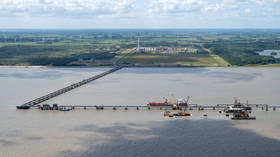Costs of German LNG terminals soar – Reuters

The acquisition and maintenance of floating liquefied natural gas (LNG) terminals will cost Germany at least €3 billion more than originally envisaged, Reuters reported on Monday, citing a statement from the country’s economy ministry.
The overall cost of the terminals, also known as Floating Storage and Regasification Units (FSRUs), is now estimated at about €6.56 billion, more than twice the original budget of €2.94 billion.
“Further costs have been determined in extensive consultations with numerous stakeholders and initial forecasts have been specified,” the ministry told the news outlet in a statement, noting that the change in the cost came from additional operating outlay and infrastructure that has to be constructed. According to the ministry, the parliamentary budget committee has already approved the rise in the funding for the terminals.
Last week, Germany completed the construction of its first floating FSRU, at the North Sea port of Wilhelmshaven. Federal economy minister Robert Habeck said at the time that Wilhelmshaven would become operational by year’s end, along with the second terminal at the Brunsbuettel North Sea port. Similar projects at Stade and Lubmin are expected to start functioning at the end of 2023, as well as the second FSRU in Wilhelmshaven. Each site has a planned regasification capacity of five billion cubic meters of LNG per year.
In total, Germany’s five FSRUs are expected to cover a third of the country’s annual gas needs, based on 2021 levels. Berlin is putting high hopes in the project in light of the drop in gas flows from Russia both due to Ukraine-related sanctions and the suspicious explosion at the Nord Stream pipeline in September, which took out a major route for Russian gas to the EU.
For more stories on economy & finance visit RT's business section












